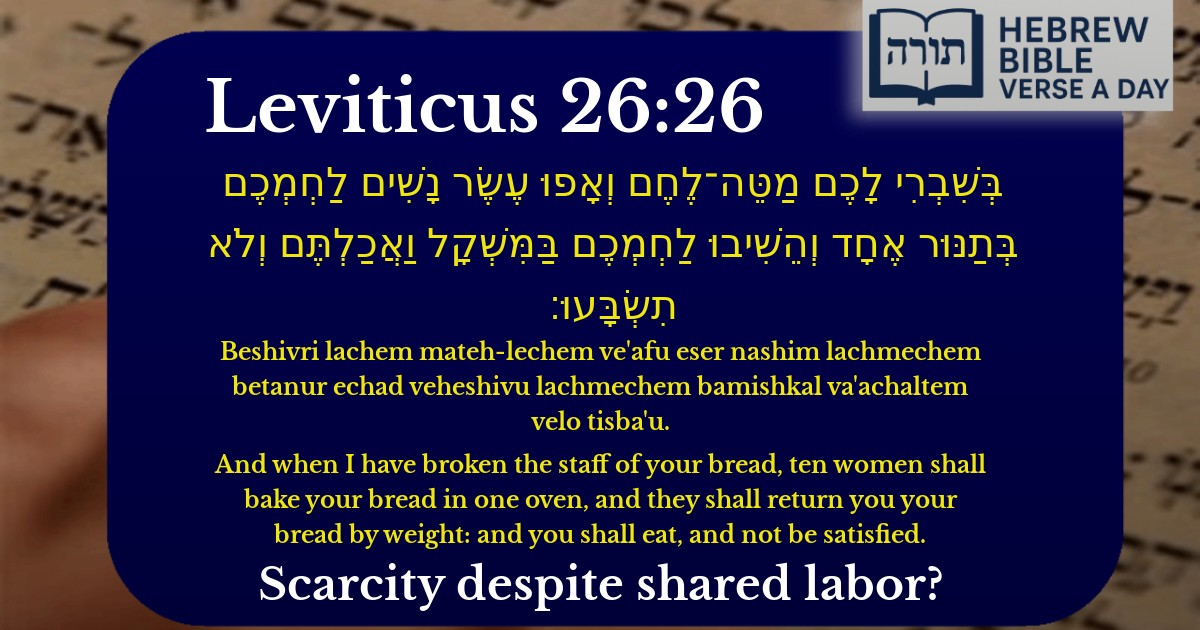Join Our Newsletter To Be Informed When New Videos Are Posted
Join the thousands of fellow Studends who rely on our videos to learn how to read the bible in Hebrew for free!
Hebrew Text
בְּשִׁבְרִי לָכֶם מַטֵּה־לֶחֶם וְאָפוּ עֶשֶׂר נָשִׁים לַחְמְכֶם בְּתַנּוּר אֶחָד וְהֵשִׁיבוּ לַחְמְכֶם בַּמִּשְׁקָל וַאֲכַלְתֶּם וְלֹא תִשְׂבָּעוּ׃
English Translation
And when I have broken the staff of your bread, ten women shall bake your bread in one oven, and they shall return you your bread by weight: and you shall eat, and not be satisfied.
Transliteration
Beshivri lachem mateh-lechem ve'afu eser nashim lachmechem betanur echad veheshivu lachmechem bamishkal va'achaltem velo tisba'u.
Hebrew Leining Text
בְּשִׁבְרִ֣י לָכֶם֮ מַטֵּה־לֶ֒חֶם֒ וְ֠אָפ֠וּ עֶ֣שֶׂר נָשִׁ֤ים לַחְמְכֶם֙ בְּתַנּ֣וּר אֶחָ֔ד וְהֵשִׁ֥יבוּ לַחְמְכֶ֖ם בַּמִּשְׁקָ֑ל וַאֲכַלְתֶּ֖ם וְלֹ֥א תִשְׂבָּֽעוּ׃ <span class="mam-spi-samekh">{ס}</span>
בְּשִׁבְרִ֣י לָכֶם֮ מַטֵּה־לֶ֒חֶם֒ וְ֠אָפ֠וּ עֶ֣שֶׂר נָשִׁ֤ים לַחְמְכֶם֙ בְּתַנּ֣וּר אֶחָ֔ד וְהֵשִׁ֥יבוּ לַחְמְכֶ֖ם בַּמִּשְׁקָ֑ל וַאֲכַלְתֶּ֖ם וְלֹ֥א תִשְׂבָּֽעוּ׃ {ס}
🎵 Listen to leining
Parasha Commentary
📚 Talmud Citations
This verse is quoted in the Talmud.
📖 Sotah 48b
The verse is cited in a discussion about the consequences of sin and divine punishment, illustrating how scarcity and hunger will affect the people as a result of their transgressions.
📖 Yoma 9b
The verse is referenced in the context of discussing the destruction of the Temple and the hardships that befell the Jewish people, emphasizing the severity of divine retribution.


Context and Source
The verse appears in Vayikra (Leviticus) 26:26, within the Tochacha (Rebuke), where Hashem warns of the consequences that will befall Bnei Yisrael if they stray from His commandments. This particular verse describes a state of scarcity and hunger as a form of divine retribution.
Literal Interpretation (Peshat)
Rashi explains that "breaking the staff of your bread" refers to a severe famine where the sustenance of bread—the staple food—will be cut off. The phrase "ten women shall bake your bread in one oven" illustrates extreme scarcity, as normally, each household would have its own oven. The bread will be rationed "by weight," meaning people will receive meager portions, and even after eating, they will remain unsatisfied (Rashi on Vayikra 26:26).
Symbolic Meaning (Derash)
The Midrash Torat Kohanim elaborates that this curse reflects a breakdown in societal harmony. Ordinarily, women bake separately for their households, but here, ten women must share one oven, indicating communal distress and lack of privacy. The phrase "they shall return you your bread by weight" suggests that even basic necessities will be measured strictly, removing any sense of abundance (Torat Kohanim 26:26).
Halachic and Ethical Implications
Rambam (Maimonides) in Hilchot Ta'anit (Laws of Fasting) teaches that famine and scarcity are wake-up calls for teshuvah (repentance). The verse underscores that material deprivation is not merely physical but also spiritual—when people lack sustenance, they must examine their deeds and return to Hashem (Hilchot Ta'anit 1:1-3).
Kabbalistic Insight
The Zohar interprets "the staff of your bread" as the divine channel (shefa) of sustenance. When this channel is "broken," blessings are withheld. The oven symbolizes the vessel (kli) for receiving sustenance, and sharing one oven among ten women signifies a constriction of divine flow due to spiritual deficiency (Zohar, Vayikra 112a).
Practical Lessons